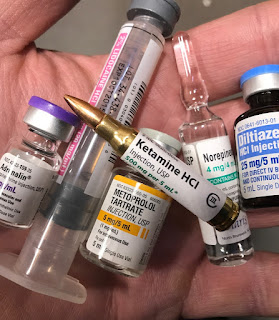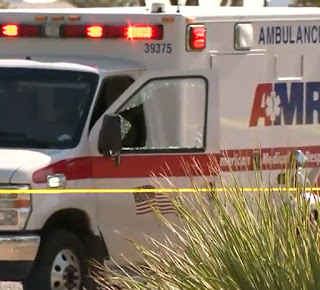No Quarter for Hiders
One of our outstanding young medics popped into my office for a chat. I was expecting him, having left him an open invitation to stop by. It was no surprise, either, when he launched into discussion about a pediatric arrest he'd responded to recently. I suspect he partially wanted to be sure he'd done everything right and that it wasn't his failure as a medic that left a family tragically short a child. Concerns such as this are commonplace following these kinds of calls - you wonder if there was something... anything that would have changed the outcome. Usually there's not, and from what I have been able to ascertain the child received excellent care from this medic, and all of the firefighters and police officers on scene.
Unfortunately, people die. Yes, even kids. This medic was struggling with a run that hit close to home for him. I could tell by the way he talked about it; he mentioned things that happened again and again. He keyed in on very minor points but with crystal clear details. He was bothered immensely, and I knew it because he did the exact same things that I do when a call hits me hard. I play it over and over in my mind. It's one of the crosses we bear in EMS.
Earlier this week I and three colleagues had another opportunity to teach EVE (http://dt4ems.com/) - a self defense course for EMS and Fire personnel. Why do we teach this? Believe it or not, it's because some people want to beat us up or even shoot at us. That's another cross we are currently bearing and a trend we're trying to change.
All this is testimony for a naked truth: EMS is not easy. It's long hours away from family. It's thankless work. It's rolling, rain or shine, to the scene of God-knows-what, and sometimes seeing the absolute worst that fate has to offer. It's a tough job. And because it's just that tough, I occasionally get defensive for our personnel and for our industry. That burning for this field and my own agape, especially for those who do the job, force me to occasionally unsheathe the pen, and drop some knowledge on people who desperately need it.
This week I have reached that point.
EMS is a career for many. It's certainly that for me and has been for over 20 years. As an EMS provider, even at the entry level of Basic EMT, EMS personnel engage in helping people who are in their worst moments. For moderate pay and with waivering levels of respect from both the health industry and other emergency responders, we charge in when summoned. We don't judge. We don't deny care to anyone. We show up, try to put broken pieces of bodies, minds, and souls back together, and then move on to the next call. On days when I feel slightly grandiose I consider us angels, for who else but angels would answer a cry for help at any hour of the day and bear one up without expectation of accolades?
For all of our efforts, we go largely unsung. That's okay- we don't do it for praise. We get hurt, too, both physically and mentally. Again, that's okay- we signed up for this so others wouldn't have to. All we are seeking is a chance to help and some modicum of respect. A friendly wave, a little cooperation when we're called, and maybe an occasional "Thank You." Those things sustain us as we slowly evolve into a true medical profession.
The external forces that thwart our drive to evolve are formidable enough, yet we sometimes are hindered by people among us, too. Enter "The Hiders."
We've had Hiders arrive at our agency, and I can only assume that other agencies have seen them, too. The Hider, in my lexicon, is an EMT whose eventual life-goals include NOTHING about actually being an EMT. They seek to use their time in EMS solely as an adjunct to something they deem to be better. The true mark of the Hider is apathy. He saunters into training lethargically and puts forth minimal effort. He hangs back on calls, won't move until asked, and wastes down time that might be better spent studying the craft. In general Hiders are difficult to teach and seem to be "skating by." Once on a truck with an FTO, they find better things to do than ask questions and be proactive. They're hiding, hoping that simply being present will help them attain whatever non-EMS goal they strive for. Maybe it's a little extra side money. Maybe it's patient contact hours for medical school. Perhaps it's a place to crash after the hangover of failing out of the academy.
Don't get me wrong. Having aspirations is wonderful, and using your experience and work (yes, WORK) in EMS to help hone your practical use of medicine or emergency response skills is an excellent idea. But if you intend to do little to nothing while waiting in an ambulance for your degree or that elusive civil service position, there are a few things you should know before you punch in for your first shift at any EMS agency.
- I have done this job probably longer than you've been alive. I have forgotten about more critical calls than you are likely to see in the time you'll be here. Other people in EMS have similar backgrounds. It is extraordinarily offensive to every last one of us when you decide to make EMS a corner store job where you can just phone it in. Patients and partners get hurt or die when you aren't on point. We do honorable, important work, but it's also hard work. We bleed physically and emotionally, and we support each other and earn each other's respect. If you can't take EMS seriously, rethink your choice of stepping stones. Better feet than yours have trodden and even fallen here.
- If you're going to medical, nursing, or PA school, don't smugly look down on EMTs and paramedics. In EMS you are literally surrounded by men and women who know far more than you do about the practical application of those things you are learning in school. Some of them could run circles around you in A&P as well. Remember what you're doing in school: TRYING. You're trying to be an MD or RN, and maybe you will be some day. But in the meantime the people in the ambulance around you are doing. Every day. 48+ hours per week. We applaud your desire to rise up. I respect your quest to surpass me in knowledge and skill someday. In return we all expect that you'll use your time on the rig to learn and be the best provider you can be, because your partners and patients depend on you.
- We're teaching lessons here, too. While you might walk out of school with a complete understanding of every neuron in the brain, we know how to communicate with, treat, and stabilize a stroke patient. When you end your university days with a full knowledge of cardiology, we've long ago mastered the art of working the code, reassuring a patient or family member, giving report to a physician, and properly documenting. We also practice and teach compassion, customer service, teamwork, leadership, and social skills- all attributes that you'll need to be successful, but which you won't learn in many college courses.
Be advised: Your temporary foray into EMS deserves and demands your respect and your undivided attention. Feel free to use us. We offer lessons for all. We welcome anyone with a true desire to help others. Just be sure you leave a little of yourself behind when you go. You don't get to take the field without a few cuts and bruises. EMS is a respectable, necessary industry, a career for many, and a religion for some. It would behoove you to embrace that notion while you're here because EMS is not a place to hide. If you're looking for that, bookstores and call centers are hiring.


Exceptional post. I love the sentiment and the explanations. I am going to shamelessly steal some of your words here and use them with our newbies. Liked and shared.
ReplyDeleteThanks for the read, Ck! Please feel free to steal any wisdom that I occasionally spew forth!
Delete